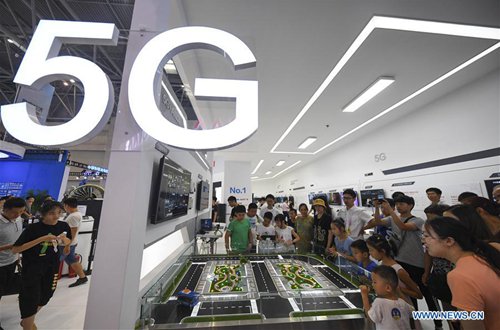SOURCE / INDUSTRIES
Lenovo freezes hiring, pay, to survive in aftermath of global pandemic

Visitors tour the exhibition area of Lenovo during the 2019 Smart China Expo in southwest China's Chongqing Municipality in August 2019. Photo: Xinhua
Many multinational technology giants have stopped hiring and even cut jobs to prepare for hard times that lie ahead, and they're concentrating on challenges brought about by the deadly coronavirus pandemic.
China's personal computer manufacturer Lenovo has stopped hiring new workers and suspended business travel, halted services outsourcing, and cancelled yearly salary raises, aiming to better survive the scourge of the novel coronavirus, according to President Yang Yuanqing.
Lenovo on Tuesday held its annual fiscal meeting online.
Yang said at the meeting that "We must prepare for the hardest times with our best efforts." He stressed that Lenovo needs to return to its fundamentals, ensure staff health, maintain normal operations, and shore up internal management.
All Lenovo factories in China have restored full production capacity, according to Yang.
Lenovo will be gravely affected if the pandemic persists, Yang noted. That's the case even though the company's liquidity position is sound and Lenovo, as well as the broader technology industry, has not been hard hit by the epidemic.
China's well-known appliance and electronics manufacturer Hisense said that it has taken steps to survive the pandemic since the company had over 40 percent of its business overseas. Senior executives have voluntarily taken pay cuts and the company plans to weed out underperforming employees.
According to a report from domestic hiring information platform Boss Zhipin, recruitment demand for new graduates between February 3 and March 31 fell by 22 percent year-on-year. The impact was felt even in fast-growing areas such as artificial intelligence (AI), where more than 70 percent of the posts required a master's degree or a doctorate.
Against the backdrop of the pandemic, Yang said that Lenovo will enhance its production capacity and grasp new opportunities. Lenovo's strategy is in line with China's new infrastructure investment plan, which focuses on the Internet of Things (IoT), data centers, 5G and AI, so Lenovo will actively develop into a core provider for the new services.
In the decade ahead, Lenovo plans to sharpen its competitiveness in the market, offer comprehensive solutions including IoT devices, infrastructure and intelligent applications, and provide a full range of services including consulting, implementation and operations.
